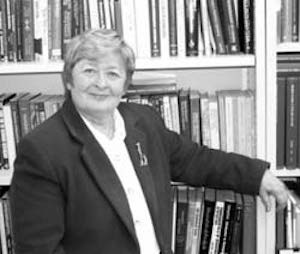Honouring the life of Dr. Phyllis Giovannetti
5 May 2023

It is with great sadness we share the news of the passing of Dr. Phyllis Giovannetti. Born and trained as a nurse in Calgary, Dr. Giovannetti moved to Edmonton in 1964 to begin a rewarding and influential career in academia and research. She received her BN from McGill University and her ScD (John Hopkins University School of Nursing and Public Health in 1981. In 1981, Dr. Giovannetti joined the Faculty of Nursing, University of Alberta, became a full Professor in 1988, and retired in 2004.
Dr. Giovannetti was known for the unwavering leadership she provided in the development of the University of Alberta's MN and PhD in Nursing program through positions including Associate Dean of Research and Graduate Studies. She continues to leave a legacy through the work of her graduate nursing students. One of these, Dr. Carole Estabrooks, remembers Phyllis for “her warmth and her generosity and for her incredibly quick intelligence and unbelievably quick and dry sense of humour. Phyllis had a significant impact on me professionally and personally, one that endures to this day”.
Her research focused on nursing and multi-disciplinary approaches to medical service delivery supporting her ethos of cooperation and collaboration in Canada’s health care system. From studies of patient classification systems for nurse staffing to quality and cost of nursing care, Dr. Giovannetti never shied away from studying how to improve patient-centred care.
Throughout her four-decade career, she worked as a consultant for many influential organizations around the world, including the World Health Organization, the National League for Nursing, and the National Institutes of Health. Dr. Giovannetti’s outstanding contributions to nursing, knowledge of the health care system, and her award-winning work within the Alberta Association of Registered Nurses (AARN) advanced the nursing profession and enhanced the image of nursing.
Her work has led to the achievement of measurable improvements in health care, health care promotion and the advancement of nursing and the health care system. We are grateful for her contributions to the profession and to the Faculty of Nursing; she will be deeply missed in our nursing community.